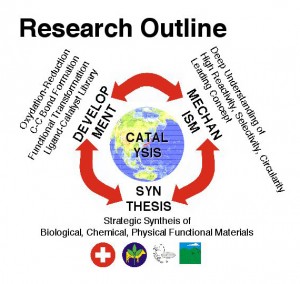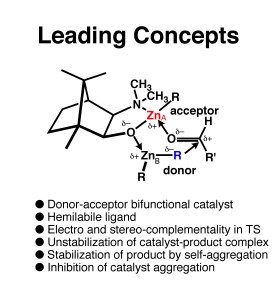Research Outline
 In order to survive the changing worlds, it is indispensable for human being to invent or create useful materials with valuable properties and functions. We believe organic chemistry constitutes a basis of such techniques. The technology is expected to supply necessary amounts of any materials at any moment. Raw materials are expected to be converted to target compounds, regardless of the scale, in an environmentally friendly, safe, resource- and energy-saving way, with high atomic efficiency and low E-factor (ratio of the amount of by-products to that of target material). We are not satisfied if we could supply materials to our society by compromising these points, even if it may be more profitable. This is the reason why we are determined to develop the methods from stoichiometric ones to catalytic ones in all the chemical conversion. We highly appreciate environmentally benign and potentially useful catalytic methodology.
In order to survive the changing worlds, it is indispensable for human being to invent or create useful materials with valuable properties and functions. We believe organic chemistry constitutes a basis of such techniques. The technology is expected to supply necessary amounts of any materials at any moment. Raw materials are expected to be converted to target compounds, regardless of the scale, in an environmentally friendly, safe, resource- and energy-saving way, with high atomic efficiency and low E-factor (ratio of the amount of by-products to that of target material). We are not satisfied if we could supply materials to our society by compromising these points, even if it may be more profitable. This is the reason why we are determined to develop the methods from stoichiometric ones to catalytic ones in all the chemical conversion. We highly appreciate environmentally benign and potentially useful catalytic methodology.
All the members of this laboratory are headed for the discovery and development of catalyst and its application to the synthesis of useful organic compounds. Also we are trying to reach the comprehensive understanding of the mechanism of catalytic reactions on the basis of our profound knowledge on the reactivity of substrates and catalytic efficiency under various reaction conditions. Our approach is also supported by the collaboration with theoretical chemist.
Effective catalytic reaction is a kind of treasure with lots of seeds on basic scientific information. Needless to say, clarification of reaction mechanism is academically important. At the same time, it sometimes gives rise to a drastic breakthrough of a new methodology of material production. We are aiming to develop various catalysts according to the leading guidelines that were constituted on the basis of information we obtained from a series of our studies concerning the mechanism of catalytic reaction. These studies include bi-functional catalysts of donor-acceptor type, metastable coordination molecule, improvement of electronic and stereo-chemical supplimentation in the transition state of reaction, destabilization o f complex of reaction products and catalyst, stabilization of reaction product by self-association of catalyst, etc.
f complex of reaction products and catalyst, stabilization of reaction product by self-association of catalyst, etc.
Clarification of the reaction mechanism always help us to construct a useful database for investigation of next generation reaction that can make possible the ready synthesis of the desired organic molecules. We firmly believe the repetition of the sequence of catalyst development, its application and clarification of reaction mechanism would gradually lead us to the advanced stages of science.


 日本語
日本語